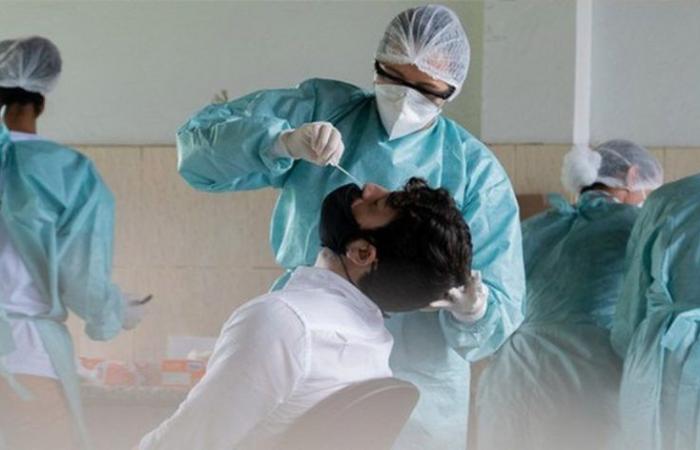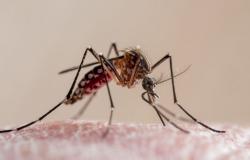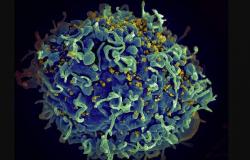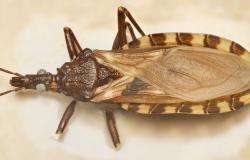Headaches, body and throat pain, runny nose and cough. These were the first symptoms felt by journalist Caroline de Paula, which made her think of a simple cold. But, after some medical appointments, a not-so-pleasant surprise: Caroline had dengue fever and Covid-19.
“I caught dengue fever and Covid on the same day, within a maximum of 24 hours between the two infections. I started having symptoms of a very strong cold. I had a very strong pain all over my body and a tingling sensation that made me feel very soft, unwell, as if I had a super cramp hitting me. There are really bad pains and sensations and the problem is that there is a risk of reinfection. That’s why I’m taking care of myself here, as much as possible, so as not to happen again”, he reported.
Amid the worst dengue epidemic in the country’s history, which has already generated more than 2 million cases, health services are concerned about the arrival of autumn, which is marked by the largest number of records of seasonal respiratory diseases, such as flu and bronchiolitis. In line with this scenario, the country still faces a high incidence of Covid-19 cases and deaths from severe acute respiratory syndrome, due to the JN.1 subvariant.
Fiocruz infectious disease specialist Júlio Croda explains that this is the first time that a dengue epidemic of this magnitude has coincided with a period of respiratory diseases in the country. This way, it is possible to get confused about the symptoms.
“We know that dengue does not have respiratory symptoms. So whoever is at the forefront at this moment, especially health professionals, has to be very attentive to make this differential diagnosis. We may have patients with fever, with body pain, This could be dengue and it could be an infection with respiratory viruses, but what will differentiate from a symptom point of view is the presence of respiratory symptoms, which is much more frequent in this seasonality of respiratory viruses”, he explained.
The president of the Minas Gerais Society of Infectious Diseases, Adelino Freire Júnior recommends a medical reassessment of symptoms, after the first few days, combined with testing.
“With a few days of evolution, things become a little clearer. So, for that patient who starts with a higher fever, body pain, which suddenly evolves into spots on the body, pain behind the eyes, do an exam, a blood count and has lower platelets, for example, this patient is very suggestive that he has dengue fever. Whereas a patient who also has a high fever, body aches and develops a cough, he may have influenza. , of flu. And, of course, it is important to use diagnostic tests that can shed light especially at this early stage,” he said.
Physical educator Daniel Rodrigues had Covid-19 after Carnival and, when he started to recover, he also caught dengue. Daniel said that some symptoms of the diseases were the same.
“With Covid, I suspected it was Covid because of the tiredness, I didn’t suspect it at all with dengue. The fever was the same, for example, the pain in the body was the same. But, the issue of tiredness was very clear to me, you know. Even on the first few days of class, I felt really bad, I was halfway through explaining the physical exercises and I was already very tired, this is noticeable with Covid”, he said.
In the case of children, infectologists highlight that this time of year is also marked by an increase in the circulation of the respiratory syncytial virus, which is the main cause of bronchiolitis. The disease is responsible for the increase in hospitalizations among this population and already represents 21.5% of cases of severe acute respiratory syndrome in the country, according to Fiocruz. In these cases, patients may experience wheezing, respiratory effort and runny nose, in addition to the need to use oxygen to improve symptoms.
This time is also prone to the appearance of sinusitis and allergic rhinitis. Regarding the first, the main symptoms include pain and pressure in the sinuses, as well as nasal discharge. Rhinitis is accompanied, for example, by sneezing, blocked and itchy noses, and can also affect the eyes, ears and throat.
To prevent the emergence of some of these diseases, experts reinforce vaccination against influenza, covid-19 and dengue, which have been well below the 90% target. Furthermore, to contain respiratory symptoms, it is recommended that patients use masks in risky environments, such as healthcare facilities.
In the case of arboviruses, prevention consists of removing outbreaks of the Aedes aegypti mosquito, in addition to using repellents and clothing that covers areas most exposed to bites, such as legs.
Tags: Dengue covid19 flu Learn differentiate symptoms Health






